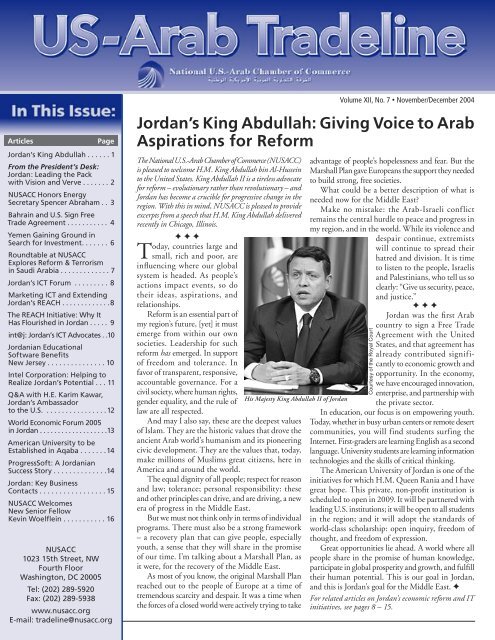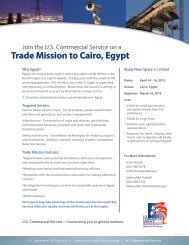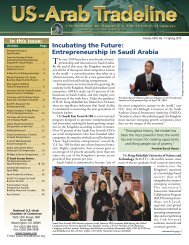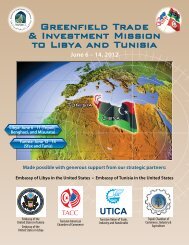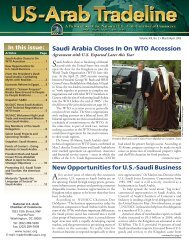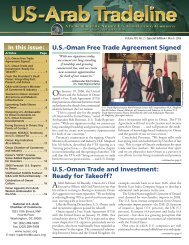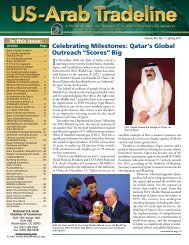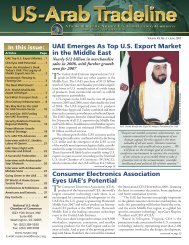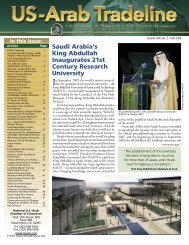Jordan - National US-Arab Chamber of Commerce
Jordan - National US-Arab Chamber of Commerce
Jordan - National US-Arab Chamber of Commerce
Create successful ePaper yourself
Turn your PDF publications into a flip-book with our unique Google optimized e-Paper software.
Volume XII, No. 7 • November/December 2004ArticlesPage<strong>Jordan</strong>’s King Abdullah . . . . . . 1From the President’s Desk:<strong>Jordan</strong>: Leading the Packwith Vision and Verve . . . . . . . 2N<strong>US</strong>ACC Honors EnergySecretary Spencer Abraham . . 3Bahrain and U.S. Sign FreeTrade Agreement . . . . . . . . . . . 4Yemen Gaining Ground inSearch for Investment. . . . . . . 6Roundtable at N<strong>US</strong>ACCExplores Reform & Terrorismin Saudi <strong>Arab</strong>ia . . . . . . . . . . . . . 7<strong>Jordan</strong>’s ICT Forum . . . . . . . . . 8Marketing ICT and Extending<strong>Jordan</strong>’s REACH . . . . . . . . . . . . . 8The REACH Initiative: Why ItHas Flourished in <strong>Jordan</strong> . . . . . 9int@j: <strong>Jordan</strong>’s ICT Advocates . . 10<strong>Jordan</strong>ian EducationalS<strong>of</strong>tware BenefitsNew Jersey . . . . . . . . . . . . . . . 10Intel Corporation: Helping toRealize <strong>Jordan</strong>’s Potential . . . 11Q&A with H.E. Karim Kawar,<strong>Jordan</strong>’s Ambassadorto the U.S. . . . . . . . . . . . . . . . . 12World Economic Forum 2005in <strong>Jordan</strong> . . . . . . . . . . . . . . . . . . . 13American University to beEstablished in Aqaba . . . . . . . 14ProgressS<strong>of</strong>t: A <strong>Jordan</strong>ianSuccess Story . . . . . . . . . . . . . . 14<strong>Jordan</strong>: Key BusinessContacts . . . . . . . . . . . . . . . . . 15N<strong>US</strong>ACC WelcomesNew Senior FellowKevin Woelflein . . . . . . . . . . . 16N<strong>US</strong>ACC1023 15th Street, NWFourth FloorWashington, DC 20005Tel: (202) 289-5920Fax: (202) 289-5938www.nusacc.orgE-mail: tradeline@nusacc.org<strong>Jordan</strong>’s King Abdullah: Giving Voice to <strong>Arab</strong>Aspirations for ReformThe <strong>National</strong> U.S.-<strong>Arab</strong> <strong>Chamber</strong> <strong>of</strong> <strong>Commerce</strong> (N<strong>US</strong>ACC)is pleased to welcome H.M. King Abdullah bin Al-Husseinto the United States. King Abdullah II is a tireless advocatefor reform – evolutionary rather than revolutionary – and<strong>Jordan</strong> has become a crucible for progressive change in theregion. With this in mind, N<strong>US</strong>ACC is pleased to provideexcerpts from a speech that H.M. King Abdullah deliveredrecently in Chicago, Illinois.✦ ✦ ✦countries large andToday, small, rich and poor, areinfluencing where our globalsystem is headed. As people’sactions impact events, so dotheir ideas, aspirations, andrelationships.Reform is an essential part <strong>of</strong>my region’s future, [yet] it mustemerge from within our ownsocieties. Leadership for suchreform has emerged. In support<strong>of</strong> freedom and tolerance. Infavor <strong>of</strong> transparent, responsive,accountable governance. For acivil society, where human rights,gender equality, and the rule <strong>of</strong>law are all respected.And may I also say, these are the deepest values<strong>of</strong> Islam. They are the historic values that drove theancient <strong>Arab</strong> world’s humanism and its pioneeringcivic development. They are the values that, today,make millions <strong>of</strong> Muslims great citizens, here inAmerica and around the world.The equal dignity <strong>of</strong> all people; respect for reasonand law; tolerance; personal responsibility: theseand other principles can drive, and are driving, a newera <strong>of</strong> progress in the Middle East.But we must not think only in terms <strong>of</strong> individualprograms. There must also be a strong framework– a recovery plan that can give people, especiallyyouth, a sense that they will share in the promise<strong>of</strong> our time. I’m talking about a Marshall Plan, asit were, for the recovery <strong>of</strong> the Middle East.As most <strong>of</strong> you know, the original Marshall Planreached out to the people <strong>of</strong> Europe at a time <strong>of</strong>tremendous scarcity and despair. It was a time whenthe forces <strong>of</strong> a closed world were actively trying to takeadvantage <strong>of</strong> people’s hopelessness and fear. But theMarshall Plan gave Europeans the support they neededto build strong, free societies.What could be a better description <strong>of</strong> what isneeded now for the Middle East?Make no mistake: the <strong>Arab</strong>-Israeli conflictremains the central hurdle to peace and progress inmy region, and in the world. While its violence anddespair continue, extremistswill continue to spread theirhatred and division. It is timeto listen to the people, Israelisand Palestinians, who tell us soclearly: “Give us security, peace,and justice.”✦ ✦ ✦<strong>Jordan</strong> was the first <strong>Arab</strong>country to sign a Free TradeAgreement with the UnitedStates, and that agreement hasalready contributed significantlyto economic growth andopportunity. In the economy,we have encouraged innovation,enterprise, and partnership withHis Majesty King Abdullah II <strong>of</strong> <strong>Jordan</strong>the private sector.In education, our focus is on empowering youth.Today, whether in busy urban centers or remote desertcommunities, you will find students surfing theInternet. First-graders are learning English as a secondlanguage. University students are learning informationtechnologies and the skills <strong>of</strong> critical thinking.The American University <strong>of</strong> <strong>Jordan</strong> is one <strong>of</strong> theinitiatives for which H.M. Queen Rania and I havegreat hope. This private, non-pr<strong>of</strong>it institution isscheduled to open in 2009. It will be partnered withleading U.S. institutions; it will be open to all studentsin the region; and it will adopt the standards <strong>of</strong>world-class scholarship: open inquiry, freedom <strong>of</strong>thought, and freedom <strong>of</strong> expression.Great opportunities lie ahead. A world where allpeople share in the promise <strong>of</strong> human knowledge,participate in global prosperity and growth, and fulfilltheir human potential. This is our goal in <strong>Jordan</strong>,and this is <strong>Jordan</strong>’s goal for the Middle East. ✦For related articles on <strong>Jordan</strong>’s economic reform and ITinitiatives, see pages 8 – 15.Courtesy <strong>of</strong> the Royal Court
From the President’s Desk<strong>Jordan</strong>: Leading the Pack with Vision and VerveN<strong>US</strong>ACC President David HamodWe have adopted a far-reaching plan that addressesthe key areas <strong>of</strong> good governance, political freedoms,women’s rights, judicial reform, economic reform,education reform, and the liberalization <strong>of</strong> theeconomy. We also are strongly committed to a keyrole by civil society. Our aim is to move towardsa system that respects diversity and guaranteespluralism at all times so that democracy is notused by any who might opt to be subject to it onceand then deny it to others.H.M. King Abdullah IIWashington, D.C., May 6, 2004No Head <strong>of</strong> State in the <strong>Arab</strong> world today isbetter positioned than H.M. King Abdullah <strong>of</strong><strong>Jordan</strong> to bridge the yawning gap between Eastand West.On the one hand, he is making the case tohis people and the nations <strong>of</strong> the region that theymust adopt unprecedented reforms if the <strong>Arab</strong>world is to safeguard its political and economicfuture in an increasingly globalized world.On the other hand, in meetings with Administration<strong>of</strong>ficials, Members <strong>of</strong> Congress, and the U.S.business community, King Abdullah bravely carriesto U.S. policymakers the <strong>Arab</strong> world’s messagesabout terrorism, Islam, Palestine, and Iraq.It both cases, it is a challenging and <strong>of</strong>tenthankless job.King Abdullah is a regular visitor to the UnitedStates, yet his visit at this juncture carries a specialsignificance because the Middle East is in anextraordinary period <strong>of</strong> transition:• The Palestinian people are searching for newleadership after the passing <strong>of</strong> the PLO’s largerthan-lifeChairman, Yasser Arafat;• Iraq is battling widespread violence as it lurchesin fits and starts toward free and fairelections;• The region has lost one <strong>of</strong> its most pivotal “wisemen,” H.H. Shaikh Zayed <strong>of</strong> the UAE, whohistorically played a central role in helping the<strong>Arab</strong> world to speak with one voice;• Ariel Sharon’s conflicted coalition in Israel isteetering on the edge <strong>of</strong> collapse, raising newfears about how deteriorating political conditionsmay stymie fragile new peace talks;• George W. Bush, about to start his second termas President, brings a new foreign policy teamto the equation – raising many questions abouthow this new team will tackle such sensitiveissues as U.S. security and democracy in theMiddle East.This is indeed a time <strong>of</strong> transition. And aswith any transition, there are remarkable opportunitiesand risks on the line.<strong>Jordan</strong>, <strong>of</strong> course, is no stranger to takingrisks. With very few natural resources, <strong>Jordan</strong>has used the resourcefulness and determination<strong>of</strong> its people to survive in a very tough neighborhood.<strong>Jordan</strong>’s extraordinary commitment tohuman resources has enabled the HashemiteKingdom to blaze trails that few others in theregion would even consider.<strong>Jordan</strong> was the first nation in the <strong>Arab</strong> worldto sign a Free Trade Agreement (FTA) with theUnited States, for example, nearly five years beforethe next signatory, Morocco (2004). As a result<strong>of</strong> <strong>Jordan</strong>’s willingness to make sacrifices andtake a chance on the FTA, it has enjoyed unprecedentedaccess to the U.S. market.In the same spirit, <strong>Jordan</strong> made a commitmentin 1999 to launch the REACH Initiative in abid to become a world-class player in the field <strong>of</strong>Information Technology. As articles in this issue<strong>of</strong> U.S.-<strong>Arab</strong> Tradeline make clear, <strong>Jordan</strong> hassome remarkable home-grown success stories, inno small part as a result <strong>of</strong> close cooperationbetween <strong>Jordan</strong>’s public and private sectors.When it comes to bolstering its knowledgebasedeconomy, <strong>Jordan</strong> is once again pulling outall the stops. The Hashemite Kingdom has placeditself at the nexus <strong>of</strong> technology and educationalreform like no one else in the <strong>Arab</strong> world and,as a result, the people <strong>of</strong> <strong>Jordan</strong> are reapingbenefits in the workplace and at home.<strong>Jordan</strong>’s willingness to go out on a limb isgaining currency, so to speak, and this is not loston other nations in the region. Some <strong>of</strong> thesecountries will “draw even” with <strong>Jordan</strong> over time,<strong>of</strong> course. But for now, <strong>Jordan</strong> is enjoying theview at the head <strong>of</strong> the pack, and there’s nolooking back.David HamodPresident2 November/ December 2004 • <strong>US</strong>-<strong>Arab</strong> Tradeline
N<strong>US</strong>ACC Honors Secretary <strong>of</strong> EnergySpencer AbrahamOn September 29, in front <strong>of</strong> a crowd <strong>of</strong> some 200corporate leaders and ambassadors, N<strong>US</strong>ACC presenteda Lifetime Achievement Award to The Honorable SpencerAbraham, U.S. Secretary <strong>of</strong> Energy. In making thisaward, N<strong>US</strong>ACC’s leadershipcelebrated the more than two decades<strong>of</strong> public service that SecretaryAbraham has given to his communityand the United States.“N<strong>US</strong>ACC is truly proud <strong>of</strong>Spence and what he has achieved,and the honor that we bestow on him“He knows that governmentmust do what it can tocreate an economic climatethat fosters investment inemerging technologies.”N<strong>US</strong>ACC’s Chairman, Don DeMarino,about Secretary Abrahamtoday is a small token <strong>of</strong> our gratitudeand pride,” said Don DeMarino,N<strong>US</strong>ACC’s Chairman. “He has never lost his appreciationfor his roots, and that has served him well throughevery phase <strong>of</strong> his public life.”DeMarino continued, “Spence has a desire to bringnew solutions to bear on old problems, and this setshim apart from many in government. He appreciatesthe risks involved in exploring new paths, and he is notafraid to take those risks. He understands the hurdlesthat entrepreneurs face, particularly small businessowners, and he assists them. And he knows that governmentmust do what it can to create an economic climatethat fosters investment in emerging technologies. Forthese reasons and more, we are privileged today to honorSecretary <strong>of</strong> Energy Spencer Abraham (center) receives a Lifetime Achievement Award fromDan DeMarino, N<strong>US</strong>ACC’s chairman (left), and David Hamod, N<strong>US</strong>ACC’s President andCEO (right).Secretary Abraham receives a congratulatory handshake from Senator Chuck Hagel at an awrdsceremony sponsored by the <strong>National</strong> U.S.-<strong>Arab</strong> <strong>Chamber</strong> <strong>of</strong> <strong>Commerce</strong>.Spencer Abraham, a genuine American success story.”In receiving the Lifetime Achievement Award,Secretary Abraham said, “It is seldom the case that onehas the opportunity to be honored – particularly in thistown! – so I want to say how grateful I am to receivethis award. In addition to thanking N<strong>US</strong>ACC, I wantto express my appreciation to the members <strong>of</strong> the ambassadorialcommunity who came here today to share theirgoodwill.”In his concluding remarks,Secretary Abraham noted, “It isexciting to see organizations likethe <strong>Chamber</strong> doing such a great jobin tackling economic challengesand developing economic opportunitiesbetween the United Statesand the <strong>Arab</strong> world. It is also greatto see increasing collaborationbetween the <strong>Chamber</strong>’s small andlarge companies in pursuit <strong>of</strong> ahigher quality <strong>of</strong> life – both in theUnited States and in the MiddleEast. I hope that through thecontinuing success <strong>of</strong> this organizationwe will see even more <strong>of</strong> thatcollaboration in the future. Keepup the good work!” ✦U.S. Secretary <strong>of</strong> EnergySpencer AbrahamN<strong>US</strong>ACC would like tothank the followingsponsors for theirsupport <strong>of</strong> the awardsceremony:<strong>US</strong>-<strong>Arab</strong> TradelineDesignRick Clark Illustration& DesignNovember/ December 2004 • <strong>US</strong>-<strong>Arab</strong> Tradeline3
“I would like tosincerely thank theco-secretariats <strong>of</strong> the<strong>US</strong>-Bahrain Free TradeAgreement Coalition,The Business Councilfor InternationalUnderstanding, The<strong>National</strong> ForeignTrade Council, andthe <strong>National</strong> <strong>US</strong>-<strong>Arab</strong> <strong>Chamber</strong> <strong>of</strong><strong>Commerce</strong> for theirtremendous effortsin support <strong>of</strong> thishistoric agreement;an agreementthat strengthensand deepens thedistinguishedrelationship betweenour two countries.”Shaikh Khalifa bin Ali Al-Khalifa,Bahrain’s Ambassador to the U.S.Bahrain and U.S. Sign Free Trade AgreementOn September 14, the United States and the Kingdom<strong>of</strong> Bahrain signed a Free Trade Agreement (FTA)that promises to give an important boost to trade andinvestment between the two long-time trade partnersand allies.Ambassador Robert Zoellick, U.S. Trade Representative,said that the new FTA will “enhance commercialrelations with an economic leader in the Gulf and setthe stage for improving trade relations and expandingopenness with other countries in the region, creatingprosperity, opportunity, and hope. This Free TradeAgreement is the next step for a nation on the move.Free trade negotiations <strong>of</strong>ten last more than a year, butBahrain’s decisive embrace <strong>of</strong> open trade and free marketspaved the way for these negotiations to close in fourmonths.”The Bahraini side was ledby the Minister <strong>of</strong> Finance and<strong>National</strong> Economy, H.E.Abdulla Hassan Saif, whodescribed the agreement as “thecapstone <strong>of</strong> five millennia <strong>of</strong>trade and commerce.”The signing ceremonycapped months <strong>of</strong> high-levelnegotiations between the twonations and ushered in the firstsuch agreement with an <strong>Arab</strong>ianGulf nation. Before the FTAcan take effect, however, it muststill receive the <strong>of</strong>ficial blessing<strong>of</strong> Congress, which is expectedto take action in the earlymonths <strong>of</strong> 2005. One Member<strong>of</strong> Congress recently describedCongressional approval <strong>of</strong> theU.S.-Bahrain FTA as “as closeto a slam-dunk as you canget.”“It is not without significance that Bahrainstill finds itself as the most importantgateway to the region sitting along thepotentially crucial trade route between aresurgent Iraq and the great Indian-Pakistanisubcontinent.”H.E Abdulla Hassan SaifMinister <strong>of</strong> Finance and <strong>National</strong> EconomyThe Bahrain Caucus on Capitol Hill has been ledby Congressmen Paul Ryan (R-WI) and Jim Turner(D-TX), each <strong>of</strong> whom has been to Bahrain to gain afirsthand understanding <strong>of</strong> that Gulf Kingdom. BothMembers <strong>of</strong> Congress attended the signing ceremony,which took place in the historic Indian Treaty Room<strong>of</strong> the Eisenhower Executive Office Building, where theUN Charter and the treaty establishing the InternationalMonetary Fund (IMF) were signed.Also attending the ceremony were members <strong>of</strong> theU.S.-Bahrain FTA Business Coalition, led by Alcoa andCitigroup and coordinated by N<strong>US</strong>ACC, the BusinessCouncil for International Understanding (BCIU), andthe <strong>National</strong> Foreign Trade Council (NFTC). TheBusiness Coalition represents a broad range <strong>of</strong> industriesincluding construction, energy, services, autos, pharmaceutical,information technology, and defense companies.According to the Office <strong>of</strong> the U.S. Trade Representative(<strong>US</strong>TR), two-way trade between the twonations was nearly $900 million in 2003. On the firstday that the new FTA goes into effect, 100 percent <strong>of</strong>While Minister Saif and Ambassador Zoellick sign the FTA, government leaders look on. Standing(from left) Representative Jim Turner; Representative Paul Ryan; Dr. Naser Al Balooshi, Bahrain’sEconomic Representative in the U.S.; H.E. Khalifa Al-Khalifa, Bahrain’s Ambassador to the U.S.;Catherine Novelli, Assistant U.S. Trade Representative; the Honorable Ron Neumann, outgoingU.S. Ambassador to Bahrain.consumer and industrial products and 81 percent <strong>of</strong>U.S. agricultural exports will be duty-free. Bahrainwill open its services market wider than any previousFTA partner, streamline digital trade, protect intellectualproperty, facilitate government procurement,and provide for effective enforcement <strong>of</strong> labor andenvironmental laws.In 2003, U.S. exports totaled more than half a billiondollars. This new trade opening will expand opportunitiesfor exports <strong>of</strong> aircraft, machinery, vehicles, pharmaceuticaland agricultural products such as meats, fruitsand vegetables, cereals, and dairy products.The FTA signing also fulfills an important recommendation<strong>of</strong> the 9/11 Commission Report, whichnoted:The U.S. government has announced the goal<strong>of</strong> working toward a Middle East Free Trade4 November/ December 2004 • <strong>US</strong>-<strong>Arab</strong> Tradeline
Area, or MEFTA, by 2013. The UnitedStates has been seeking comprehensivefree trade agreements (FTAs) with theMiddle Eastern nations most firmly onthe path to reform. The U.S.-Israeli FTAwas enacted in 1985, and Congressimplemented an FTA with <strong>Jordan</strong> in2001. Both agreements have expandedtrade and investment, thereby supportingdomestic economic reform. In 2004, newFTAs were signed with Morocco andBahrain, and are awaiting Congressionalapproval. These models are drawing theinterest <strong>of</strong> their neighbors. Muslimcountries can become full participantsin the rules-based global trading system,as the United States considers loweringthe trade barriers with the poorest <strong>Arab</strong>nations.Recommendation: A comprehensive U.S. strategyto counter terrorism should include economicpolicies that encourage development, moreopen societies, and opportunities for people toimprove the lives <strong>of</strong> their families and toenhance prospects for their children’s future.The 9/11 Commission Report, pages 378-379One week after the FTA was signed, the BahrainGateway held a luncheon with business leaders in NewYork City to commemorate the historic signing. A variety<strong>of</strong> government leaders addressed the crowd, includingMinister Abdulla Saif <strong>of</strong> Bahrain and Assistant U.S.Minister Saif (center), Catherine Novelli <strong>of</strong> <strong>US</strong>TR, and David Hamod <strong>of</strong>N<strong>US</strong>ACC visit at the Bahrain Gateway event in New York City.Trade Representative Catherine Novelli. Three representatives<strong>of</strong> the private sector also served as guestspeakers: Antranig Sarkissian, Vice President GroupMarketing Executive at Citigroup; Tawfiq Al Moayyed,Deputy Chairman, Bahrain <strong>Chamber</strong> <strong>of</strong> <strong>Commerce</strong>and Industry; and David Hamod, President & CEO <strong>of</strong>N<strong>US</strong>ACC.“Even in these times <strong>of</strong> instantaneouscommunications, Bahrain’s uniquecombination <strong>of</strong> location and historypermits easy access to clients and home<strong>of</strong>fices. It is <strong>of</strong>ten said by senior financial<strong>of</strong>ficers that in Bahrain, one can dobusiness with both Tokyo and New Yorkduring a full working day.”H.E Abdulla Hassan SaifMinister <strong>of</strong> Finance and <strong>National</strong> Economy“This FTA is asolid agreement.It sets the pacefor the rest <strong>of</strong>the Gulf and is astrong model forthe <strong>Arab</strong> world asa whole.”David HamodPresident & CEO <strong>of</strong>N<strong>US</strong>ACCMinister Saif (left) and Ambassador Zoellick (right) “shake on it.”In his remarks, Hamod described Bahrain as “theLittle Engine That Can. Bahrain – with its resourcefulness,determination, and visionary leadership – takeson tough jobs and succeeds at them in ways that biggerengines can only dream about.”In a recent statement, Hamod noted, “N<strong>US</strong>ACC isproud and grateful for the opportunity to support theFTA discussions between these two important allies.”Shaikh Khalifa bin Ali Al-Khalifa, Bahrain’s Ambassadorto the United States, expressed his appreciationfor the U.S.-Bahrain FTA Coalition this way: “I wouldlike to sincerely thank the Secretariat <strong>of</strong> the <strong>US</strong>-BahrainFree Trade Agreement Coalition – The Business Councilfor International Understanding, The <strong>National</strong> ForeignTrade Council, and the <strong>National</strong> <strong>US</strong>-<strong>Arab</strong> <strong>Chamber</strong> <strong>of</strong><strong>Commerce</strong> – for its tremendous efforts in support <strong>of</strong>this historic agreement, an agreement that strengthensand deepens the distinguished relationship between ourtwo countries.” ✦November/ December 2004 • <strong>US</strong>-<strong>Arab</strong> Tradeline5
“Yemen todayhas undergonea transformationin recognition <strong>of</strong>the fact that theprivate sector roleis essential fordevelopment.”Yemen Gaining Ground in Search for InvestmentOn November 17, N<strong>US</strong>ACC and the Middle EastFree Trade Agreement (MEFTA) Coalition cohosteda roundtable discussion featuring H.E. AhmedS<strong>of</strong>an, Yemen’s Deputy Prime Minister and Minister <strong>of</strong>Planning and International Cooperation. Held at theOffice <strong>of</strong> the U.S. Trade Representative in conjunctionwith Yemen’s Trade and Investment Framework Agreement(TIFA) talks, the event was limited to 25 U.S.business leaders.Yemen’s Deputy Prime Minister Ahmed S<strong>of</strong>an (center) and <strong>US</strong>TR’s CatherineNovelli (right) address business leaders at a roundtable discussion on Yemen.Minister S<strong>of</strong>an, who has helped to guide Yemen’sdevelopment efforts for much <strong>of</strong> the past two decades,highlighted some <strong>of</strong> the positive trends taking place inhis nation. The World Bank and Transparency International,he suggested, have both lauded steps taken byYemen in recent years to encourage transparency andfight corruption.In the same vein, the financial community is showingincreasing confidence in Yemen’s economic stability andfinancial institutions. Yemen has not defaulted on anyloans, for example, and its debt-to-GDP ratio (27 percent)is the lowest in the region, Minister S<strong>of</strong>an said. Thenation’s cash reserves are in good shape, he continued,and rating agencies recently upgraded Yemen’s creditworthiness. In addition, the Export Import Bank <strong>of</strong> theUnited States has enhanced its presence and increasedits credit line in Yemen.On the security front, Minister S<strong>of</strong>an said, Yemenhas closely aligned its policies <strong>of</strong> fighting terrorism withthose <strong>of</strong> the United States and the international community.He pointed out that since the bombing <strong>of</strong> the <strong>US</strong>SCole by Yemeni extremists, there have been no instances<strong>of</strong> terrorism, and the Government <strong>of</strong> Yemen has crackeddown on local groups involved in questionable activities.In part because <strong>of</strong> this “get tough” approach, MinisterS<strong>of</strong>an suggested, there have been no kidnappings inYemen since 2001.Minister S<strong>of</strong>an said that in the past, Yemen, like manydeveloping nations, relied very heavily on the governmentto drive the economy. Yemen today, he said, has undergonea “transformation” in recognition <strong>of</strong> the fact that the“private sector role is essential for development.” Onaverage, he said, it now takes 96 days to establish a businessin Yemen, and the government is working toreduce that number further.The hydrocarbon sector holds “greatpromise,” said Minister S<strong>of</strong>an, noting thatthree-quarters (74 percent) <strong>of</strong> the hydrocarbon-richareas are not yet part <strong>of</strong> anyconcessions.Minister S<strong>of</strong>an also touted the telecommunicationssector, noting that a major newopportunity is “nearly ready to go.” Yemenis actively seeking private investment in thetelecom sector and, to this end, some 25– 40 percent <strong>of</strong> the new venture’s shares willbe set aside for the public. Moreover,according to Minister S<strong>of</strong>an, strict limitswill be placed on the number <strong>of</strong> shares thatcan be owned or controlled by any oneindividual.In some instances, the Government <strong>of</strong>Yemen is turning to outside consultants toprovide expertise or advice that will serve the businesscommunity and investors. Minister S<strong>of</strong>an admitted, forexample, that there are some “holes to repair in Yemen’sprocurement practices.” In response to such problems,the Government <strong>of</strong> Yemen is now following the WorldBank’s procurement procedures and Yemen recentlyhired Crown Agents to help plug these holes. In anotherexample, the Government <strong>of</strong> Yemen asked Lloyds tolook into the tenfold increase in rates <strong>of</strong> maritime freightinsurance. Lloyds determined that Yemen is remarkablysafe and secure and that the huge insurance increase isunfounded.In concluding his remarks, Minister S<strong>of</strong>an invitedmembers <strong>of</strong> the U.S. business community to come toYemen to see for themselves what steps the nation hastaken to reform its economy, bring about political change,and stabilize its financial markets. The new level <strong>of</strong>transparency in business, he concluded, will “produceresults that will raise your eyebrows!” ✦For more information about specific projects in Yemen,click onto the Web sites <strong>of</strong> Yemen’s General InvestmentAuthority (www.giay.org) and the Aden Free Zone(www.aden-freezone.com).6 November/ December 2004 • <strong>US</strong>-<strong>Arab</strong> Tradeline
Roundtable at N<strong>US</strong>ACC Explores Reform andTerrorism in Saudi <strong>Arab</strong>ia“Envision yourselves in a museum in front <strong>of</strong> anancient tapestry that depicts a famous and mythicaltale <strong>of</strong> love and pain. Being old, it has one smallsquare inch at the bottom right-hand corner withfrayed threads. Imagine that a camera zooms ontothis square inch and projects it onto a screen the size<strong>of</strong> the original tapestry. And so, through the power<strong>of</strong> this medium, you have lost sight <strong>of</strong> the beautifulstory <strong>of</strong> the tapestry and you see only the negativeimage <strong>of</strong> the minute, frayed fault.”On October 7, N<strong>US</strong>ACC and the Center for InternationalPrivate Enterprise (CIPE) hosted aroundtable discussion on Reform and Terrorism in Saudi<strong>Arab</strong>ia. Mr. Amr Khashoggi was the featured speakerfor the event, which was held at N<strong>US</strong>ACC and attendedby upwards <strong>of</strong> 50 public and private sector representatives.Khashoggi is CEO <strong>of</strong> the Amkest Group in Saudi<strong>Arab</strong>ia and is a regular visitor to the United States.Khashoggi talked about internal pressures for reform,with more than 60 percent <strong>of</strong> the population under theage <strong>of</strong> 20, and external pressures, including those fromthe United States and Europe. Khashoggi noted thatAmr Khashoggi, CEO <strong>of</strong> Amkest Group, addressed a full house atN<strong>US</strong>ACC.many in the West seek to transform Saudi <strong>Arab</strong>ia intothe image <strong>of</strong> America and Europe. “I believe this iscounter-productive,” Khashoggi stated, “and it underminesthe efforts <strong>of</strong> Saudis who want to move the countryforward, yet not lose sight <strong>of</strong> the important role Islamand our historical traditions play in the development <strong>of</strong>the individual, the family, and society.”Khashoggi noted that steps have been taken towardreform in such areas as the media, labor, insurance,capital markets, and tourism. There are now greateropportunities for women in the workplace, he noted,and municipal elections are on track.“Everyone recognizes that we must progress, and wemust overcome the challenges facing our nation,”Khashoggi stated. “We need to come up with internallydeveloped solutions that are the result <strong>of</strong> national debateand that have gained what you in America would call‘buy in’ from a highly conservative population. Thisdebate will take time and must be based on open,transparent, and honest dialogue, and the extent <strong>of</strong> itwill dictate the speed and pace <strong>of</strong> implementing reformsin Saudi <strong>Arab</strong>ia.”On terrorism, Khashoggi noted that an environmentconducive to reform can only be maintained once matters<strong>of</strong> terrorism and internal security have been adequatelyaddressed.He outlined steps that the Saudi government hastaken to address terrorism, including:• Improving coordination among security agencies;• Freezing the assets <strong>of</strong> individuals and groupsdesignated as supporter <strong>of</strong> terrorism;• Instituting new banking policies and procedures;• Monitoring financial transactions; and• Instituting harsh penalties for money launderingand terrorism financing.Khashoggi noted that Juan Zurate <strong>of</strong> the U.S.Treasury Department’s Office <strong>of</strong> Terror Financing saidrecently that the “targeted actions undertaken by theKingdom have already produced tangible results, andthe systematic changes made by the Kingdom couldprove even more effective in defeating terrorist financingover the long term.”Khashoggi highlighted the fact that Saudi <strong>Arab</strong>ia isthe largest market for the U.S. in the Middle East, andSaudi private investment in the U.S. exceeds $500billion. “Saudi <strong>Arab</strong>ia is ranked the 25th largest importer/exporter worldwide,” he said, “and in 2002, trade betweenthe Kingdom and the U.S. amounted to $18 billion.U.S. companies are the largest foreign investors in theKingdom, with over 280 Saudi-U.S. joint ventures.”The United States and Saudi <strong>Arab</strong>ia “have been alliesand friends for 50 years,” Khashoggi observed. “Thetwo countries fought Iraqi aggression together in thefirst Gulf War and continue to cooperate after the falland capture <strong>of</strong> Saddam Hussein. The basis <strong>of</strong> ourrelationship is strategic cooperation, and we have a longhistory <strong>of</strong> successes.”Khashoggi expressed surprise at how little the Saudisand the Americans understand each other as people—even after all this time. “We need to reach out… tocommunicate with one another,” he noted. “It’s aboutbridging the gap <strong>of</strong> understanding, or bridging the gap<strong>of</strong> ignorance. We’re not there yet. Still, small steps arebeing taken in that direction.”“Let me close by saying that Saudi <strong>Arab</strong>ia and theU.S., despite what anyone might say, share many importantvalues and respect and understand each other’sdifferences. Let us not allow the likes <strong>of</strong> Osama BinLaden to succeed in driving a wedge between our twonations.” ✦Amr Khashoggi takes questionsabout reform and terrorism inSaudi <strong>Arab</strong>ia.“Everyonerecognizes that wemust progress, andwe must overcomethe challengesfacing our nation.”Amr Khashoggi, CEOAmkest Group <strong>of</strong> Saudi <strong>Arab</strong>iaNovember/ December 2004 • <strong>US</strong>-<strong>Arab</strong> Tradeline7
“Technologicaldevelopment,legislative change,and expansion <strong>of</strong>the capabilities <strong>of</strong>human resourceshave all played a keyrole in convincingglobal andregional investorsthat investmentopportunities areavailable in ourdynamically growingmarket.”Dr. Fawaz Zu’bi, <strong>Jordan</strong>’sMinister <strong>of</strong> Information andCommunications Technology<strong>Jordan</strong> ICT Forum: “A Global Meeting <strong>of</strong> the Mindsin the Heart <strong>of</strong> Digital <strong>Arab</strong>ia”John <strong>Chamber</strong>s <strong>of</strong> Cisco Systems Cites Explosion <strong>of</strong> ICT Use in the <strong>Arab</strong> World<strong>Jordan</strong> recently staged its third Information andCommunications Technology (ICT) Forum, asuccessor to Forums that the Hashemite Kingdomhosted in 2000 and 2002. The September 14 & 15event, held on the shores <strong>of</strong> <strong>Jordan</strong>’s Dead Sea, focusedfor the first time on the regional ICT sector with a viewto consolidating the regional market, taking advantage<strong>of</strong> economies <strong>of</strong> scale, and promoting a more competitiveinvestment climate in the <strong>Arab</strong> world.“The Forum set the agenda for future developmentand growth <strong>of</strong> the region’s ICT market throughpromoting a path <strong>of</strong> a regional cooperation and synergy,”says Dr. Fawaz Zu’bi, <strong>Jordan</strong>’s Minister <strong>of</strong> Informationand Communications Technology. “Technologicaldevelopment, legislative change, and expansion <strong>of</strong> thecapabilities <strong>of</strong> human resources have all played a keyrole in convincing global and regional investors thatinvestment opportunities are available in our dynamicallygrowing market.”As if to underscore this point, John <strong>Chamber</strong>s,President and CEO <strong>of</strong> Cisco Systems, noted that therehas been a 219 percent increase in Internet usage in theMiddle East during the period 2000 – 2004. Regionalleaders included Saudi <strong>Arab</strong>ia (650 percent increase),Egypt (500 percent), Bahrain (389 percent), Qatar (320percent), and <strong>Jordan</strong> (273 percent). <strong>Chamber</strong>s stressedthat future jobs will migrate to those nations with thebest educated work forces, the most supportive governments,the most reliable infrastructures, and the mostinnovative programs.Said <strong>Chamber</strong>s: “The ICT market in this region isa dynamic and growing area, and I believe internationalenterprises recognize the value <strong>of</strong> the potential technologyopportunities available. I truly believe <strong>Jordan</strong> can playa key role in shaping the region’s critical technologyinfrastructure to create unprecedented growth, education,and productivity opportunities.”This year’s Forum drew more than 600 delegates fromaround the world and featured 40 speakers, includingH.M. King Abdullah II <strong>of</strong> <strong>Jordan</strong>. The Hashemite Kingtouted the many advantages <strong>of</strong> <strong>Jordan</strong> as an ICT hub,but he admonished the <strong>Arab</strong> world against resting on itslaurels. “As we move forward, the world moves faster,”he said, noting that the Middle East and North Africa(MENA) region is responsible for just 1.5 percent <strong>of</strong> worldexports and that only one out <strong>of</strong> three citizens in theregion is able to find local employment.<strong>Jordan</strong> used this year’s Forum to launch the <strong>National</strong>ICT Policy and Strategy, inaugurate <strong>Jordan</strong>’s <strong>National</strong>Broadband Network, draw attention to <strong>Jordan</strong>’s e-Governmentprogram, announce the privatization <strong>of</strong> <strong>Jordan</strong>’s postalservice, and highlight an important new initiative to increasePC penetration and Internet uptake in <strong>Jordan</strong>.At the Forum, the Information Technology Association<strong>of</strong> <strong>Jordan</strong> (int@j) announced that <strong>Jordan</strong>’s ICT sectorachieved 30 percent growth in revenues during the pastyear, with a particular increase in national exports.According to Int@j, domestic revenues <strong>of</strong> theKingdom’s ICT sector topped $226 million, achievinga growth <strong>of</strong> 20 percent compared to 2002. As for exportrevenues, they achieved 74 percent growth, reachingnearly $70 million. Total revenues for the ICT sectorhit $295 million, achieving a 30 percent growth incomparison with 2002.“Over the last few years, the ICT sector in <strong>Jordan</strong>has succeeded in positioning itself among the leadingand fastest growing markets in the region; the results<strong>of</strong> our exports are further pro<strong>of</strong> <strong>of</strong> the capabilities <strong>of</strong>this dynamic sector in sharing its expertise and solutionswith regional and international markets,” noted MarwanJuma, Chairman <strong>of</strong> int@j. “The development and thegrowth <strong>of</strong> the ICT sector has played a crucial role increating new job opportunities and has been one <strong>of</strong> thekey contributors in the growth <strong>of</strong> other sectors.” ✦Marketing ICT and Extending <strong>Jordan</strong>’s REACHTwo years ago, Craig Barrett, President & CEO <strong>of</strong>Intel Corporation, noted that <strong>Jordan</strong> has “set aprecedent for change in the Middle East region. It hasdemonstrated the achievements that can result fromstrong cooperation between the public and privatesectors, particularly in the field <strong>of</strong> information andcommunications technology (ICT).”This is high praise from one <strong>of</strong> the world’s ICTpioneers. But it wasn’t always this way. A decade ago,<strong>Jordan</strong>’s Information Technology (IT) sector was virtuallynon-existent. Then came the REACH Initiative.8 November/ December 2004 • <strong>US</strong>-<strong>Arab</strong> Tradeline“For private firms, it was easy to blame governmentbureaucracy for lack <strong>of</strong> growth in the IT sector. Wewere given the opportunity to identify those obstaclesand suggest solutions to overcome them,” says KarimKawar, <strong>Jordan</strong>’s Ambassador to the United States, whowas one <strong>of</strong> the driving forces behind the REACH initiative.“Some saw it as a major challenge, to get fiercecompetitors to sit in the same room and discuss thefuture <strong>of</strong> this nascent industry. Some <strong>of</strong> us saw it as agreat opportunity!”continued on next page
continued from previous pageIn October 1999, Kawar and his colleagues in the<strong>Jordan</strong> Computer Society sent a report to H.M. KingAbdullah II outlining an ambitious strategic planthat would turn <strong>Jordan</strong> into a regional ICT leaderand internationally recognized exporter <strong>of</strong> ICTproducts and services. Within five years, the reportnoted, the fruits <strong>of</strong> the REACH Initiativewould create 30,000 new jobs,attract $150 million in foreign directinvestment, and generate $550 millionin annual IT exports.Today, five years after the launch <strong>of</strong>REACH, it is clear that the program hasnot hit all <strong>of</strong> its targets – in part because<strong>of</strong> recessions in the global ICT market, aswell as violence in the Middle East. Butthe REACH Initiative has accomplishedsomething that no one thought possible in the 1990s: Ithas developed an internationally competitive IT industryin <strong>Jordan</strong> – one that attracts foreign and local investment,generates high-value jobs, modernizes the nation’s publicand private sectors, and positions <strong>Jordan</strong> favorably in theworld’s increasingly important knowledge-basedeconomy.The REACH Initiative has also fostered unprecedentedlevels <strong>of</strong> cooperation between <strong>Jordan</strong>’s governmentand the business community. According to REACH4.0, the most recent report prepared by the InformationTechnology Association <strong>of</strong> <strong>Jordan</strong> (Int@j), “Public-privatepartnerships in <strong>Jordan</strong> have never been stronger or moredynamic, with the Ministry <strong>of</strong> Informationand Communications Technology(MoICT) working side by side with<strong>Jordan</strong>’s IT industry association.”As a result, according to this samereport, “REACH is now part <strong>of</strong> a trulynational initiative for achieving e-readinessand beyond. The momentum thatthe launch <strong>of</strong> REACH first sparked hasinspired a host <strong>of</strong> new initiatives designedto employ technology as a tool forbridging the digital divide and enhancing the lives <strong>of</strong>all <strong>Jordan</strong>ians.”For more information about the REACH Initiative,check out its Web site at www.reach.jo. Ofparticular interest is the 2004 REACH 4.0 report,“An Updated Strategy and Action Plan for H.M.King Abdullah II.” ✦<strong>Jordan</strong> has “seta precedent forchange in theMiddle East region.It has demonstratedthe achievementsthat can result fromstrong cooperationbetween the publicand private sectors,particularly in thefield <strong>of</strong> informationand communicationstechnology (ICT).”Craig BarrettPresident & CEO <strong>of</strong>Intel CorporationThe REACH Initiative: Why It Has Flourished in <strong>Jordan</strong><strong>Jordan</strong> is on the cutting edge <strong>of</strong> ICT developmentin the <strong>Arab</strong> world. The centerpiece <strong>of</strong> this effort isthe REACH Initiative, which has become a worldclassprogram thanks to <strong>Jordan</strong>’s visionary leadershipand a remarkable partnership between that nation’spublic and private sectors.Five years ago, the founders <strong>of</strong> REACH pinpointedthe importance <strong>of</strong> developing a home-grown ICTindustry in these terms:“Rapid growth and accelerating innovation –central characteristics <strong>of</strong> the ICT industry – <strong>of</strong>ferenormous opportunities. As with the IndustrialRevolution before, the timing, positioning and actions<strong>of</strong> nations will determine those who will benefit fromthis Knowledge Revolution, and those who will beleft behind. It creates a great sense <strong>of</strong> urgency, sincedelay will lead to incalculable opportunity costs,making catching-up ever more difficult.”The REACH Initiative, supported by <strong>US</strong>AID’sAchievement <strong>of</strong> Market-Friendly Initiatives and Results(AMIR) Program, is a comprehensive framework thatembraces actions in terms <strong>of</strong>:Regulatory FrameworkEnabling Environment (Infrastructure)Advancement ProgramsCapital & FinanceHuman Resource Development<strong>Jordan</strong> is uniquely qualified to excel in Informationand Communications Technologies for a variety<strong>of</strong> reasons:<strong>Jordan</strong>’s favorable location and position in theregional market. Its talented workforce, bilingual<strong>Arab</strong>ic/English language capabilities, extensiverelationships in the region, and time-zone localadvantages, favorably position <strong>Jordan</strong> with respect topotential competitors.Human-resource intensity. S<strong>of</strong>tware and ITservices require skilled human capital. <strong>Jordan</strong>’s welleducatedworkforce provides a comparative advantagefor these activities. Students are enrolling in computerrelateddisciplines in record numbers, and there is anatural inclination and enthusiasm for developingIT skills that owes much to the country’s relativelyopen intellectual environment.Lack <strong>of</strong> distance or transportation constraints.Unlike manufacturing and tourism, which are affectedby transportation mechanisms, s<strong>of</strong>tware services area “distance-less” industry. Its inputs and outputs aretransmitted electronically, and there is relatively littlefluctuation when it comes to disruptive externaldevelopments.Low start-up capital requirements. This makesit easier and less risky for market entry by <strong>Jordan</strong>ianfirms, particularly small and medium-sized enterprises(SMEs). ✦“As with theIndustrial Revolutionbefore, the timing,positioning andactions <strong>of</strong> nationswill determinethose who willbenefit fromthis KnowledgeRevolution”REACH InitiativeNovember/ December 2004 • <strong>US</strong>-<strong>Arab</strong> Tradeline9
int@j is working topromote industryinvestmentopportunities in<strong>Jordan</strong>, includingVenture Capital (VC)prospects and InitialPublic Offerings(IPOs)With EduWave,students are ableto access theirlearning contentinside and outsidetheir classrooms,during and afterschool hours.int@j: <strong>Jordan</strong>’s ICT AdvocatesThe Information Technology Association <strong>of</strong> <strong>Jordan</strong>(int@j), an outgrowth <strong>of</strong> the REACH Initiative, hasbecome the premier advocacy group for expandinginformation and communications technology in <strong>Jordan</strong>.The mission <strong>of</strong> this non-pr<strong>of</strong>it association is to “represent,promote, and advance the <strong>Jordan</strong>ian s<strong>of</strong>tware andIT services industry in the global market.”int@j is working to fulfi ll its mission through thefollowing objectives:Advocate industry issues – represent ICT industryinterests and lobby with government and internationalgroups; propose national initiatives and conduct publicrelations efforts.Promote industry investment opportunities in<strong>Jordan</strong> – promote Venture Capital (VC) and InitialPublic Offerings (IPOs); form relationships with localexport-oriented groups; represent the industry at conferencesand trade shows; set up databases and publicizemembership through web sites, newsletters, hyperlinks,promotional materials and advertising.Provide industr y research and market information– conduct market studies; disseminate local, regional andinternational opportunities; monitor market trends.Effect standardization, certification and qualitycontrol in the ICT industry – promote certificationbodies and their value; enforce an ICT industry code<strong>of</strong> ethics; standardize employment contracts and benefitpackages.<strong>Jordan</strong>ian Educational S<strong>of</strong>twareBenefits New JerseyIn one <strong>of</strong> the first instances <strong>of</strong> <strong>Jordan</strong>ian informationtechnology fi nding a niche in the U.S. market, theIntegrated Technology Group (ITG) <strong>of</strong> <strong>Jordan</strong> hasbegun selling its “EduWave” s<strong>of</strong>tware to school districtsin New Jersey.EduWave, an innovative K-12 instructional andelectronic learning management solution, strengthensthe ability <strong>of</strong> educators, students, and administratorsto harness and enhance the learning experience <strong>of</strong> theInternet. In <strong>Jordan</strong> alone, EduWave serves over 3,000schools, nearly 1.2 million students, over 50,000 teachers,and some 5,000 administrators. The <strong>Jordan</strong>ian governmenthas made the system its core national e-learningSupport humanresource development –work with educationalinstitutions to focus oncritical skills; strengthenties with local universitiesand collaborate withoverseas universities; andinitiate industry programsto benefit universitystudents.Advance industry intellectual property rights(IPR) – certify IPR compliance; update members inIPR law changes; and work toward local IPR regulationsconducive to ICT industry growth.Form international ICT industry alliances –actively seek alliances with global players; develop andattract venture capital funds; and disseminate successstories.Manage industry stakeholder relations and resolveindustry conflicts – build and reinforce bridges amongassociation members and between association membersand government, media, universities, NGOs anddonors.For more information, check out the int@j Web site atwww.intaj.net ✦platform, and other countriesin the region are beginning tomove in the same direction.EduWave got its start in1999 when ITG recognizedthe vast potential in the globale-learning industry and thecritical need for learningmanagement systems that were comprehensive enoughto handle large-scale, countrywide deployments. Thefirm won its first major deal in 2003 when it contractedwith <strong>Jordan</strong>’s Ministry <strong>of</strong> Education to serve that nation’s3,200 public schools. A few months later, EduWavereceived the UN World Summit Award after beingselected from over 800 products from 135 countries.For more information onEduWave and other ITGproducts, please visit thecompany’s website atwww.itgsolutions.com. ✦10 November/ December 2004 • <strong>US</strong>-<strong>Arab</strong> Tradeline
Intel Corporation: Helping to Realize <strong>Jordan</strong>’sPotentialIntel Corporation, the world’s largest chipmaker, hasmade significant investments in <strong>Jordan</strong> in recent yearsas a result <strong>of</strong> the Hashemite Kingdom’s strong commitmentto information technology (IT). Intel <strong>of</strong>fers thelatest technology solutions to multinational companies,local systems integrators, and independent s<strong>of</strong>twareproviders.“Intel stronglybelieves in the needto spread the use <strong>of</strong>IT in cross-sections<strong>of</strong> society to helpcountries achieve aknowledge-basedeconomy andcompete at the globallevel,” says AbdulJarrar, Intel’sRegional GovernmentAffairsManager for theMiddle East, Turkey,and Africa. “In view<strong>of</strong> that, we support<strong>Jordan</strong>’s IT initiativesand want tocontinue workingwith the <strong>Jordan</strong>iangovernment to play a key role in enabling this transformationthroughout the Kingdom.”Intel’s first “Teach to the Future” program in theMiddle East was established in <strong>Jordan</strong> in 2003. To date,more than 15,000 teachers in <strong>Jordan</strong> have been trainedas part <strong>of</strong> this program, a worldwide effort to help bothexperienced teachers and pre-service teachers integratetechnology into instruction. Participating teachers receiveextensive instruction and resources to promote effectivetechnology use in the classroom.Launched in 2000, the “Teach to the Future” programhas trained more than one million classroom teachersin 30 countries, and this number is expected to rise totwo million teachers by the end <strong>of</strong> 2005.Intel is also about to open the second Intel ComputerClubhouse in <strong>Jordan</strong>. At the Clubhouse, underservedyouth have access to high-tech equipment and mentorsin order to develop skills that encourage self-confidenceand foster creativity and opportunities.In 2002, when Intel CEO Craig Barrett gave thekeynote address at the <strong>Jordan</strong> ICT Forum, Barrettinaugurated an Internet Laboratory (I-Lab) at theUniversity <strong>of</strong> <strong>Jordan</strong>. The first I-Lab in the <strong>Arab</strong> world,it forms part <strong>of</strong> the University’s King Abdullah II College<strong>of</strong> Information Technology.The I-Lab provides an academic forum to test andevaluate new entrepreneurial business models and theirtechnical implementation with the assistance <strong>of</strong> Internettechnologies and high-tech solutions. The I-Lab alsoprovides a research and development environment forareas such as simulation, content translation and localizationinto the <strong>Arab</strong>ic language, image processing,Craig Barrett , CEO <strong>of</strong> Intel Corporation, during his keynote speech at IDF Spring 2004 in San Francisco.voice recognition, and multimedia.”We thank Intel Corporation for its contributionand the support <strong>of</strong> all involved,” noted Dr. Ahmad AlJaber, Dean <strong>of</strong> the Faculty <strong>of</strong> Information Technologyat the College. “We want to create an incubator whereacademic staff can provide the support for start-upcompanies and innovative business and research ideas.We are really looking forward to a long, fruitful andcontinuous relationship with Intel.”Barrett concluded his 2002 visit on a cautionarynote: “<strong>Jordan</strong> is taking the right steps towards creatingits digital future, but long-term economic prosperitywill require new approaches to business and technologyinnovation,” he said in a speech to government andbusiness leaders. “<strong>Jordan</strong> should accelerate its investmentin the Internet, reduce taxes and tariffs on informationtechnology (IT) products, foster entrepreneurs, protectintellectual property, and build a strong educationalfoundation that trains the workforce tomorrow.”“In the digital future, people will access the Webany time and any place with devices and infrastructurethat <strong>of</strong>fer both computing and communication capabilities,”Barrett said at the time. “Countries that intendto successfully compete in tomorrow’s global digitaleconomy will move fast to invest in education andinformation technology and let both flourish.” ✦The Teach to theFuture programhas trained morethan one millionclassroom teachersin 30 countries,and this numberis expected to riseto two millionteachers by theend <strong>of</strong> 2005.November/ December 2004 • <strong>US</strong>-<strong>Arab</strong> Tradeline 11
H.E. Karim Kawar, <strong>Jordan</strong>’sAmbassador to the United States“Like his father,our monarch (H.M.King Abdullah) is avisionary leader whobelieves in change,in reform, and ina better future foreach and everyindividual.”Q&A with H.E. Karim Kawar, <strong>Jordan</strong>’sAmbassador to the United States1) As the United States and <strong>Jordan</strong> prepare for thesecond term <strong>of</strong> President George W. Bush, how wouldyou assess relations between our two nations? Wheredo we go from here?<strong>Jordan</strong> enjoys excellent relations with the UnitedStates on all levels, including political, economic, culturaland educational. <strong>Jordan</strong> and the U.S. work together inthe pursuit <strong>of</strong> peace, progress and prosperity in theregion but also to build a better future for our twocountries and our two peoples. We certainly look forwardto continue working with the Bush Administrationduring the second term. H.M. King Abdullah will bevisiting Washington in December to discuss pressingissues in the region, namely the peace process, the situationin Iraq, reform, as well as other bilateral matters.2) What are the hallmarks <strong>of</strong> King Abdullah’s leadership,and how does it differ from that <strong>of</strong> his father, KingHussein?H.M. King Abdullah has certainly carried on H.M.the late King Hussein’s legacy in <strong>Jordan</strong> and in theinternational arena. Like his father, our monarch is avisionary leader who believes in change, in reform, andin a better future for each and every individual. Likehis father, King Abdullah II has faith in <strong>Jordan</strong>’s mostvaluable resource: its human capital. Hence, he hasspearheaded various initiatives to advance <strong>Jordan</strong>’ssociety, modernize our social and economic system, andintegrate <strong>Jordan</strong> as a knowledge economy and modernopen society into the global arena.Since King Abdullah’s accession to the throne in1999, <strong>Jordan</strong> has faced various challenges, internal andotherwise – from unemployment, to poverty, to thePalestinian-Israeli conflict, to the war on terror, and tothe war on Iraq. Those challenges were met with aforceful and far-reaching domestic agenda based oneconomic, social and political reform and a pragmaticand vigorous foreign policy in the pursuit <strong>of</strong> peace,stability, and economic prosperity. Moreover, KingAbdullah has worked tirelessly to confront the threats<strong>of</strong> terrorism in <strong>Jordan</strong> and in the global arena, and toshow the true face <strong>of</strong> Islam to the world.3) The Social and Economic Transformation Program(SETP), established in 2002, places a heavy emphasison developing <strong>Jordan</strong>’s human resources. Is this programmaking a difference?Certainly and impressively. <strong>Jordan</strong>’s real GDP growthreached 7.2 percent in the first half <strong>of</strong> 2004, up from 3.2percent in 2003 and 5 percent in 2002. Per capita incomehas also witnessed modest growth. The SETP is ahomegrown program for social and economic reform thatis supported by donor countries, including the UnitedStates. In 2002 and 2003, $145.9 million was allocatedfor human resource development within the Social andEconomic Transformation Program (SETP).One <strong>of</strong> the most important achievements is theextensive effort to computerize schools. To date, 500schools – involving some 173,000 students – have beencomputerized, resulting in a decrease in the ratio <strong>of</strong>students-to-personal-computers from 42 to 21. Moreover,32,000 teachers have been trained on ICDL, and anadditional 2,070 schools now have Internet access. 200kindergartens, 6 new schools, 374 additional classrooms,and 3 new educational directorates have also beenestablished throughout <strong>Jordan</strong>, leading to the phasingout<strong>of</strong> double shifts in most governorates.Implementation <strong>of</strong> a quality control system hascommenced and Education Reform for a KnowledgeEconomy (ERfKE) program has been launched. TheEduWave initiative has also been launched, with theaim <strong>of</strong> incorporating ICT into every facet <strong>of</strong> life topromote education and the transformation <strong>of</strong> the educationalsystem to be a driver <strong>of</strong> the economy. Moreover,17 youth centers, 4 youth camps, and other investmentshave been channeled toward youth care to nurtureknowledge-acquisition, confidence, teamwork, andentrepreneurship.Vocational and technical training also ranks highon <strong>Jordan</strong>’s reform agenda, as 14 new training centershave been established. Through the <strong>National</strong> TrainingProgram, 8,000 people have received – or are still inthe process <strong>of</strong> receiving – demand-driven training.Furthermore, laws that regulate the labor market havebeen amended to encourage private sector participation,while other investments have been channeled towardupgrading the capabilities <strong>of</strong> existing training centers.4) You personally played an instrumental role in <strong>Jordan</strong>’spositioning itself as a center for IT activity in the region.How does <strong>Jordan</strong> intend to maintain its comparativeadvantage in this sector?In <strong>Jordan</strong>, our focus has been on building a competitiveadvantage rather than a comparative advantage.In the field <strong>of</strong> Information Technology, we are notcompeting with countries in the region, but with theworld leaders. Our competitive advantage lies in ourability to supply knowledge workers through our highereducation system, sustaining our open market policy,and growing the sophisticated demand from the localmarket. These are coupled with national and foreigninvestments that seek to capitalize on this advantage inthe value-added products and services that <strong>Jordan</strong>ianfirms provide, thereby complementing the work carriedout by multinational firms supplying customers in theregion and around the world. In the long term, we willmaintain our leadership position through a significantinvestment in R&D that will sustain our edge.continued on next page12 November/ December 2004 • <strong>US</strong>-<strong>Arab</strong> Tradeline
continued from previous page5) The Free Trade Agreement (FTA) between the U.S.and <strong>Jordan</strong> is hailed as a major success story. Whatadvice might <strong>Jordan</strong> give to other nations that arecontemplating FTA’s <strong>of</strong> their own?<strong>Jordan</strong>, as you know, is the first <strong>Arab</strong> country to signa Free Trade Agreement with the United States. The FTAcertainly brought <strong>Jordan</strong> many advantages on the economiclevel. It not only boosted the level <strong>of</strong> trade between thetwo countries and ranked the U.S. as <strong>Jordan</strong>’s number onetrading partner, but it also instilled confidence in U.S.multinationals to invest in <strong>Jordan</strong> and through <strong>Jordan</strong> tothe regional market. <strong>Jordan</strong>’s trade with the U.S. increasedfrom $386 million in 2000 to $1.15 billion in 2003.Moreover, trade with the most sophisticated consumermarket in the world has helped our industries meet thehighest standards <strong>of</strong> quality and delivery which, in turn,enables us to compete in other Western markets.We certainly encourage other countries in the regionto follow suit, such as Morocco and Bahrain, and wehope that we can capitalize on cumulating rules <strong>of</strong> originto increase trade among the countries <strong>of</strong> the region.6) How has strife in neighboring Iraq affected <strong>Jordan</strong>?<strong>Jordan</strong> is one <strong>of</strong> Iraq’s six neighbors. Iraq was <strong>Jordan</strong>’stop trading partner before the war broke out in March2003. The conflict has certainly had a negative impact onour economy. We depended heavily on Iraq for oil, andthat was certainly disrupted during the war. Fortunately,and thanks to a vigorous economic plan, we have managedto pull through and advance even further this year. Tradewith Iraq is currently gaining more momentum.<strong>Jordan</strong> has become a safe haven and an operationalbase for U.S. and other foreign companies in Iraq.Serving as a launching pad for all humanitarian andtrade operations through the Gulf <strong>of</strong> Aqaba, <strong>Jordan</strong> isalso a business gateway to Iraq. A number <strong>of</strong> <strong>Jordan</strong>iancompanies have won subcontracts in Iraq and are nowhelping in the reconstruction effort. Moreover, <strong>Jordan</strong>and Iraq have set up various partnerships on the business,governmental and civil society levels. As you may know,<strong>Jordan</strong> is also providing training for Iraqi security forces,journalists, judges, engineers and others.7) In May 2005, <strong>Jordan</strong> will host the World EconomicForum meeting, “From Vision to Action: IdentifyingSolutions.” What do you expect to be the highlights <strong>of</strong>this gathering?The previous World Economic Forum meetings thatwere held on the shores <strong>of</strong> the Dead Sea (2003 and 2004)were very successful venues in which the challenges thatthe region faced were identified, discussed and debatedby world leaders, academics, pr<strong>of</strong>essionals, entrepreneursand participating students. These meetings are extraordinaryas they bring the issues <strong>of</strong> the region to the regionin which representative delegates participate.There was also a general consensus about the differentways and means in which those challenges should andwould be met. We all shared a vision at the past two WorldEconomic Forum meetings that looked to the futuregenerations <strong>of</strong> the region as THE region’s future, therebyhighlighting the importance <strong>of</strong> reform, development andmodernization. We recognize that there is no one-sizefits-allsolution to the problems we face, so we meet toexchange ideas and to agree to disagree and accept ourdifferences. We hope this meeting will focus on puttinginto place plans <strong>of</strong> action through which our vision forthe future and our rhetoric translates into deeds. ✦“In the field<strong>of</strong> InformationTechnology, weare not competingwith countries inthe region, butwith the worldleaders.”Ambassador Karim KawarWorld Economic Forum 2005 in <strong>Jordan</strong>“From Vision to Action: Identifying Solutions”Dead Sea, <strong>Jordan</strong>20-22 May, 2005Topics <strong>of</strong> discussionwill include:• The future <strong>of</strong> Iraq• New directions in the Israeli-Palestinian dispute• Does Iran have a nuclear future?• Implications <strong>of</strong> the new <strong>US</strong>administration• Inter-<strong>Arab</strong> relations• The Middle East and the new EUwww.weforum.org/jordanFor moreinformation on the Summit contact:jordanmeeting@weforum.orgNovember/ December 2004 • <strong>US</strong>-<strong>Arab</strong> Tradeline 13
“This projectrepresents a modelpublic-privatepartnership, andwe are delightedto providesignificant supportfor the creation<strong>of</strong> this importantnew Americanuniversity.”Imad FakhouryASEZA Deputy ChiefCommissioner and Chairman<strong>of</strong> the Board <strong>of</strong> ADCAmerican University to be Set Up in AqabaBy Dalya DajaniAMMAN — The Kingdom is gearing up for thedevelopment <strong>of</strong> a new private, non-pr<strong>of</strong>it Americanuniversity on Aqaba’s southern shores, with a sistercampus in Amman.The Aqaba Development Corporation (ADC) andthe Aqaba Special Economic Zone (ASEZ) signed anagreement this week for the university’s constructionon 250 dunums <strong>of</strong> land on the Red Sea coastal shore.The agreement was signed between ASEZA DeputyChief Commissioner and Chairman <strong>of</strong> the Board <strong>of</strong>ADC Imad Fakhoury and Safwan Masri, pr<strong>of</strong>essorand vice dean at Columbia University’s BusinessSchool on behalf <strong>of</strong> the university’s fund.Modeled on the American system <strong>of</strong> higher education,the university is expected to attract studentsfrom here and across the region. It is expected to caterto up to 6,000 students over the next 10 to 12 yearswith over 40 majors in schools for liberal arts andsciences, management, engineering, education andlaw. Around 2,500 <strong>of</strong> the total student capacity areexpected to be studying in Aqaba.Through its consortium <strong>of</strong> affiliations by academicprograms, the university will also expose students toa rich platform <strong>of</strong> educational and cultural exchangeswith top tier U.S. colleges.“This project represents a model public-privatepartnership, and we are delighted to provide significantsupport for the creation <strong>of</strong> this important newAmerican university,” said Fakhoury.According to Fakhoury, the university, which isscheduled for completion in 2009, is also expected toplay a significant role in the development <strong>of</strong> Aqaba,particularly in meeting ASEZ’s long-term developmentplans.“The establishment <strong>of</strong> this campus represents akey building-bloc in the ASEZ master plan and astrategic enabler within the comprehensive long-termplan <strong>of</strong> ASEZA and its development arm, ADC, totransform Aqaba into a leading business and leisuredestination on the Red Sea,” said Fakhoury.“The population <strong>of</strong> faculty, staff and students willboth contribute to and benefit from the diverse andvital community we plan to foster in the Aqaba SpecialEconomic Zone,” he added.Home to some 60,000 <strong>Jordan</strong>ians, Aqaba, <strong>Jordan</strong>’ssole port city, was transformed into a special economiczone in 2001. It has since witnessed a rapid increasein infrastructure and commercial development thathas transformed the area into a breeding ground forinvestment.Such investment in the southern region falls inline with the vision <strong>of</strong> His Majesty King Abdullahfor the creation <strong>of</strong> a knowledge-based economy forthe future <strong>of</strong> <strong>Jordan</strong> and the region.During a visit with the Economic Club <strong>of</strong> Chicagoand the Chicago Council on Foreign Relations in June,King Abdullah described the university as one thatwould “adopt the standards <strong>of</strong> world-class scholarship,open inquiry, freedom <strong>of</strong> thought and expression.”Reprinted with permission from<strong>Jordan</strong> Times, November 29, 2004ProgressS<strong>of</strong>t: A <strong>Jordan</strong>ian Success Story<strong>Jordan</strong>’s heavy emphasis onInformation Technology isgiving rise to a variety <strong>of</strong> worldclass<strong>Jordan</strong>ian IT companies. Onehome-grown success story that isnot new to <strong>Jordan</strong> is ProgressS<strong>of</strong>t, established in 1989and <strong>Jordan</strong>’s first s<strong>of</strong>tware development company.According to Michael Wakileh, Chief Executive Officer<strong>of</strong> ProgressS<strong>of</strong>t, the firm’s solutions are “completely andindependently developed in <strong>Jordan</strong> by <strong>Jordan</strong>ian s<strong>of</strong>twareengineers and designers. The s<strong>of</strong>tware meets the latesttechnological advances in s<strong>of</strong>tware development and isbuilt according to international standards.”The ProgressS<strong>of</strong>t track record is impressive by anystandard:• ProgressS<strong>of</strong>t introduced the first signature14 November/ December 2004 • <strong>US</strong>-<strong>Arab</strong> Tradelineverification system in the region.• ProgressS<strong>of</strong>t solutions aredistributed and installed in 19countries worldwide, includingEngland, Germany, Canada,and the United States.• ProgressS<strong>of</strong>t has become a technology partner toAmerica’s Hewlett Packard, which is nowmarketing ProgressS<strong>of</strong>t’s electronic check clearingsolution around the globe.• ProgressS<strong>of</strong>t is the first company worldwide toestablish an Electronic “Image-Based” CheckClearing Solution. The s<strong>of</strong>tware was first introducedby ProgressS<strong>of</strong>t in 1996 and will becontinued on next page
continued from previous pageimplemented in the United States in keeping withthe Check21 Act, which became effective onOctober 28, 2004.According to Wakileh, ProgressS<strong>of</strong>t is currently doinglive presentations <strong>of</strong> its pioneering product for such U.S.banks as Bank <strong>of</strong> America, Bank <strong>of</strong> New York, JP MorganChase, Citibank, The Federal Reserve and the ClearingHouse <strong>of</strong> New York – CHIPS. In addition, a pilot projectfor the electronic check clearing solution will be implementedby ProgressS<strong>of</strong>t in SWIFT (New York). The firmwas awarded the Electronic Check Clearing Project bythe Central Bank <strong>of</strong> <strong>Jordan</strong> in June 2004.ProgressS<strong>of</strong>t is a regular visitor to such internationalfairs as Sibos and CeBIT. Sibos 2004, the world’s premierfinancial event, was held in Atlanta, Georgia this year,where ProgressS<strong>of</strong>t demonstrated its revolutionary electroniccheck clearing solution to U.S. clearing houses, U.S. banks,and banking firms from all around the globe.In Wakileh’s words, “<strong>Jordan</strong>’s main treasure is thehighly intellectual human resource. With His Majesty’svision to employ this treasure in pr<strong>of</strong>essional s<strong>of</strong>twaredevelopment and IT services, <strong>Jordan</strong> is becoming as<strong>of</strong>tware development hub, hosting outstanding s<strong>of</strong>twaredevelopment companies which <strong>of</strong>fer pr<strong>of</strong>essional s<strong>of</strong>twaresolutions to countries all around the globe.” ✦ProgressS<strong>of</strong>tsolutions aredistributedand installedin 19 countriesworldwide,including England,Germany, Canada,and the UnitedStates.JORDAN: Key Business ContactsEmbassy <strong>of</strong> <strong>Jordan</strong>, Washington DCEconomic and <strong>Commerce</strong> Bureau (ECB)Mr. Maher Matalka, Director3504 International Drive, NW, Washington, DC 20008Tel: 202-362-4436Fax: 202-244-0239www.jordanembassyus.orgEmbassy <strong>of</strong> the United States in AmmanMr. Richard Eason, Economic CounselorP.O. Box 354, Amman-11118, <strong>Jordan</strong>Tel: +962-6-592-0101Fax: +962-6-592-7653EasonRM@state.govInformation Technology Association <strong>of</strong> <strong>Jordan</strong> (Int@j)Mr. Bilal Abuzeid, Acting CEOP.O. Box 2383, Amman-11953, <strong>Jordan</strong>Tel: +962-6-515-2322Fax: +962-6-515-2344www.intaj.net<strong>Jordan</strong> American Business Association (JABA)Ms. Rose Al Issi, CEOP.O. Box 840817, Amman-11184, <strong>Jordan</strong>Tel: +962-6-565-1860Fax: +962-6-565-1862www.jaba.org.jo<strong>Jordan</strong> Dead Sea Products Manufacturers AssociationMr. Sami Bakir, Executive CoordinatorP.O. Box 9504, Amman-11191, <strong>Jordan</strong>Tel: +962-6-533-7748Fax: +962-6-533-7748www.deadseajordan.com<strong>Jordan</strong> Export Development & Commercial CentersCorporation (JEDCO)Mr. Salah Ghunaim, Acting Director GeneralP.O. Box 7704, Amman-11118, <strong>Jordan</strong>Tel: +962-6-560-3507Fax: +962-6-568-4568www.jedco.gov.jo<strong>Jordan</strong> Foreign Trade Policy DepartmentMs. Maha Ali, DirectorP.O. Box 2019, Amman-11195, <strong>Jordan</strong>Tel: +962-6-560-7191Fax: +962-6-560-7640www.jftp.gov.jo<strong>Jordan</strong> Investment Board (JIB)Ms. Reem Badran, Director GeneralP.O. Box 893, Amman-11821, <strong>Jordan</strong>Tel: +962-6-553-9370Fax: +962-6-560-8416www.jib.com.jo<strong>Jordan</strong> Stone & Tile Exporters Association (JOSTONE)Mr. Rasmi Hamzeh, CEOP.O. Box 41865, Amman-11194, <strong>Jordan</strong>Tel: +962-6-565-0939Fax: +962-6-568-4266www.jostone.com<strong>Jordan</strong> Telecommunications Regulatory CommissionMs. Muna Nijem, CommissionerP.O. Box 850967, Amman-11185, <strong>Jordan</strong>Tel: +962-6-586-2020Fax: +962-6-586-3641www.trc.gov.jo<strong>Jordan</strong>-<strong>US</strong> Business Partnership (J<strong>US</strong>BP)Mr. Nayef Stetieh, Vice PresidentP.O. Box 941865, Amman-11194, <strong>Jordan</strong>Tel: +962-6-566-9135Fax: +962-6-568-4266www.jusbp.org<strong>Jordan</strong>ian Association <strong>of</strong> Manufacturers <strong>of</strong>Pharmaceutical & Medical Supplies (JAPM)Ms. Hanan Sboul, Secretary GeneralP.O. Box 941247, Amman-11194, <strong>Jordan</strong>Tel: +962-6-560-5634Fax: +962-6-569-1116www.japm.comThe Executive Privatization CommissionMr. Adel Al-Kodah, ChairmanP.O. Box 941536, Amman-11194, <strong>Jordan</strong>Tel: +962-6-567-0556Fax: +962-6-462-6254www.epc.gov.joThe Institute <strong>of</strong> Management Consultants <strong>of</strong> <strong>Jordan</strong> (IMC)Ms. Salwa Bamieh, ChairmanP.O. Box 926550, Amman-11110, <strong>Jordan</strong>Tel: +962-6-553-0856Fax: +962-6-553-0858www.imc.com.jo<strong>US</strong> <strong>Jordan</strong> Business AllianceMs. Marjorie Adams, President1725 I Street, NW Suite 300, Washington, DC 20006Tel: 202.349.3792Fax: 202.349.3915www.usjba.orgNovember/ December 2004 • <strong>US</strong>-<strong>Arab</strong> Tradeline 15
NATIONAL <strong>US</strong>-ARABCHAMBER OFCOMMERCE<strong>National</strong> Headquarters:1023 15th Street, NWFourth FloorWashington, DC 20005Tel: (202) 289-5920Fax: (202) 289-59381330 Post Oak BoulevardSuite 1600, Office 1644Houston, TX 77056Tel: (713) 963-4620Fax: (713) 963-46098929 South SepulvedaBoulevard, Suite 310Los Angeles, CA 90045Tel: (310) 646-1499Fax: (310) 646-2462420 Lexington AvenueSuite 2034New York, NY 10170Tel: (212) 986-8024Fax: (212) 986-0216©2004 <strong>National</strong> <strong>US</strong>-<strong>Arab</strong> <strong>Chamber</strong><strong>of</strong> <strong>Commerce</strong> (N<strong>US</strong>ACC). Allrights reserved. No part <strong>of</strong> thispublication may be reproduced,stored in a retrieval system, ortransmitted in any form or by anymeans, electronic, photocopying,recording, or otherwise, withoutprior written permission <strong>of</strong> the<strong>National</strong> <strong>US</strong>-<strong>Arab</strong> <strong>Chamber</strong> <strong>of</strong><strong>Commerce</strong>.N<strong>US</strong>ACC Welcomes New Senior Fellow Kevin WoelfleinThe <strong>National</strong> U.S.-<strong>Arab</strong> <strong>Chamber</strong> <strong>of</strong> <strong>Commerce</strong>(N<strong>US</strong>ACC) has just named it first Senior Fellow,Kevin Woelflein, who brings a wealth <strong>of</strong> expertise ininternational banking.Until recently, Woelflein served in Iraq as the CoalitionProvisional Authority’s SeniorAdvisor on banking issues. In thatcapacity, he played an instrumentalrole in creating the Private Bankers<strong>of</strong> Iraq (PBI), a pr<strong>of</strong>essional associationrepresenting Iraq’s 19 privatebanks.Prior to his tenure in Iraq,Woelflein served in senior positionsat a number <strong>of</strong> banks, including TheFirst <strong>National</strong> Bank <strong>of</strong> Chicago andAmerican Security Bank inWashington, D.C.Upon joining N<strong>US</strong>ACC,Woelflein said, “I want to express myappreciation for the opportunity tobe associated with N<strong>US</strong>ACC.N<strong>US</strong>ACC’s business objectives areimportant to the development <strong>of</strong>private sector business between the United States andthe <strong>Arab</strong> world. I feel that my experience, especially myrecent tenure in Iraq, will help N<strong>US</strong>ACC to achieve itsobjectives.”Since his arrival at N<strong>US</strong>ACC, Woelflein has givenspeeches and participated in panel discussions in anumber <strong>of</strong> forums, including the annual meeting inChicago <strong>of</strong> the Trade Conference <strong>of</strong> the BankersAssociation for Finance and Trade, a conference hostedby the Middle East Economic Digest in Dubai, a Department<strong>of</strong> <strong>Commerce</strong> briefing on the banking situationKevin Woelflein (left) joined other bankers and economists inbriefing 40 Iraqi government <strong>of</strong>ficials undergoing training at theU.S. Department <strong>of</strong> <strong>Commerce</strong>.in Iraq, and a roundtable discussion jointly organizedby the Coalition for Employment Through Exports(CEE), the <strong>National</strong> Foreign Trade Council (NFTC),and N<strong>US</strong>ACC.Woelflein says there is good news to relate about theKevin Woelflein speaks at the Metropolitan Club at a luncheon co-hosted by CEE, NFTCand N<strong>US</strong>ACC.progress <strong>of</strong> the banking sector in Iraq. Among the pointsthat he has made in recent weeks:• Numerous international foreign banks are takingactive steps to establish their presence in Iraq,including HSBC, NBK, Standard Chartered,Export & Finance Bank, The <strong>Arab</strong> Bank, and<strong>Arab</strong> Banking Corporation.• The Central Bank <strong>of</strong> Iraq has established muchhigher than minimum capital requirements fornew Iraqi investor groups planning to form sevennew private banks. This is intended to ensure thatIraq’s private banks will be well capitalized. Theresult is that the potential loan funds from privatebanks may be increased by about $750 million inthe near future.• New bank licensing by the Central Bank <strong>of</strong> Iraqincludes three banks to be headquartered in theKurdish region in northern Iraq. Thus, banklicensing will be one <strong>of</strong> the first importanteconomic developments to help integrate the KurdArea into Federal Iraq.• The private banks have organized themselves into apr<strong>of</strong>essional association in order to serve as a singlevoice on issues affecting private banks, to promotethe concept <strong>of</strong> bank accounts for Iraqis, and to linkthe Iraqi association to all bankers associationsworldwide. The private banks have also been activein establishing the Iraq Commercial BankingCenter, a facility to provide training for bank staff.N<strong>US</strong>ACC’s leadership is pleased and proud to welcomeKevin Woelflein to N<strong>US</strong>ACC! ✦


